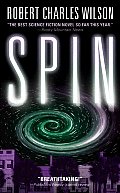
| Series: | Spin #1 |
| Publisher: | Tor |
| Copyright: | April 2005 |
| Printing: | February 2006 |
| ISBN: | 0-765-34825-X |
| Format: | Mass market |
| Pages: | 454 |
Tyler Dupree grew up with the twins Diane and Jason Lawton, children of the rich industrialist E.D. Lawton and both geniuses (Jason somewhat more so than Diane). It wasn't exactly an equal relationship; Tyler was the son of the housekeeper for the Big House where the twins lived. But he and his mother lived in a cottage on the property and they nonetheless grew up together and became close friends. Then, one evening in the yard when Tyler was twelve and the twins thirteen, the stars disappeared.
Spin is told in two threads of first-person narrative, one set in the future (and titled "4 x 10^9 A.D.", which makes more sense later on) and one that retells Tyler's life starting from that night in the back yard. One of the things Wilson does best in this book is interweave the two storylines into the revelatory climax of the book. It can be a touch frustrating, as the future Tyler knows what the reader wants to know but plays coy until the necessary background story has been told, but the timing is excellent. The future segments are short, cryptic, and fleeting while Wilson builds the background and then slowly lengthen and develop a plotline of their own as the book builds towards its climax. The gold standard of two-narrative books is to be left wishing for a few more scenes in other plotline each time there's a switch, and Wilson comes close.
The main thread of the book is the past, where it follows Tyler's life against the background of the world reaction to the disappearance of the stars. Or, rather, Tyler talks about his life, but the true focus is on the lives of Jason Lawton, who dives into the scientific puzzle of what people come to call the Spin, and Diane Lawton, who loses herself in emotional and spiritual ways of coping with what is happening to the world. Jason provides Tyler with gradual revelations and explanations of new phenomena, while fighting the overwhelming and controlling shadow of his father. Tyler struggles with his crush on Diane and tries to come to terms with her religious beliefs (a well-done take on millennial Christianity). The background is all science fiction, and big idea, sweeping SF at that, but the details are all about people, their relationships, and their attempts to build lives in very strange times.
There are good parts and bad parts to how Wilson tells this story. He does convey a strong sense of realism, a feeling of an inhabited world with believable reactions and realistic timeframes. When the world-changing moment first happens, the world doesn't change, not right away. Institutions, beliefs, and daily lives have momentum, politics have their own concerns, and the search for scientific understanding quickly becomes political. Wilson's slow, deliberate storytelling and gentle construction of emotional contexts for his characters provides a rich, layered feeling.
On the other hand, Tyler is frustratingly passive. Perhaps because he's being used as the viewport into a complex scientific story and clashes of powerful, dramatic characters, he frequently seems overwhelmed and detached. He's the observer and chronicler, telling the story for us and swept up in it, not steering. This isn't out of character; others comment on it in the course of the story, Tyler notices and analyzes it in himself, and it does seem to fit his personality. But it does make for a passive, documentary, expository feel in places, even when Wilson avoids the traditional lumps of exposition. This is not a book with much dramatic action, either emotional or physical. There are select scenes that raise the intensity level, but only to the level you would find in frequently in other novels. Spin doesn't grab you and pull you in; instead, the story builds slowly and the background mysteries surrounding the disappearance of the stars are what kept me reading.
The background, though, is engrossing. I won't go into specific details, since the slow discovery is much of the joy of the book, but suffice it to say that there are truly mysterious aliens, frightening astrophysics, terraforming, hugely ambitious engineering projects, and a final revelation that was more satisfying than I was expecting. The big ideas are all a bit abstract, and often delivered in exposition rather than first-person observation, but the book is still full of satisfying thought experiments. It's not full of detailed realism; Wilson uses the different focus of his narrator (Tyler is a medical doctor, not a physicist) to handwave through many of the details and save the realism for the interpersonal relationships. But, despite a bit of distance and abstraction and a feeling even at the end that one is reading about the most dramatic changes on the news rather than living through them, this part of the book holds up well.
If I sound admiring but muted, that captures my overall feeling about Spin. Wilson tackled a big story with a long timeline and some huge ideas and pulled it satisfyingly, but rarely did Spin grab me and make it hard for me to put the book down. I think the quiet emotional tone and detached feeling of Tyler towards the world are primarily responsible for that. I kept waiting for emotional fireworks that never really happened; at some times, like Tyler's avoidance of a box of his mother's possessions that practically had "Major Clue" written on the side of it, I got the feeling Tyler was subconsicously dodging any strong emotional connection with the world. Still, even with that caveat, this is a well-written book with interesting ideas. Recommended.
Followed by Axis.
Reviewed: 2006-03-26